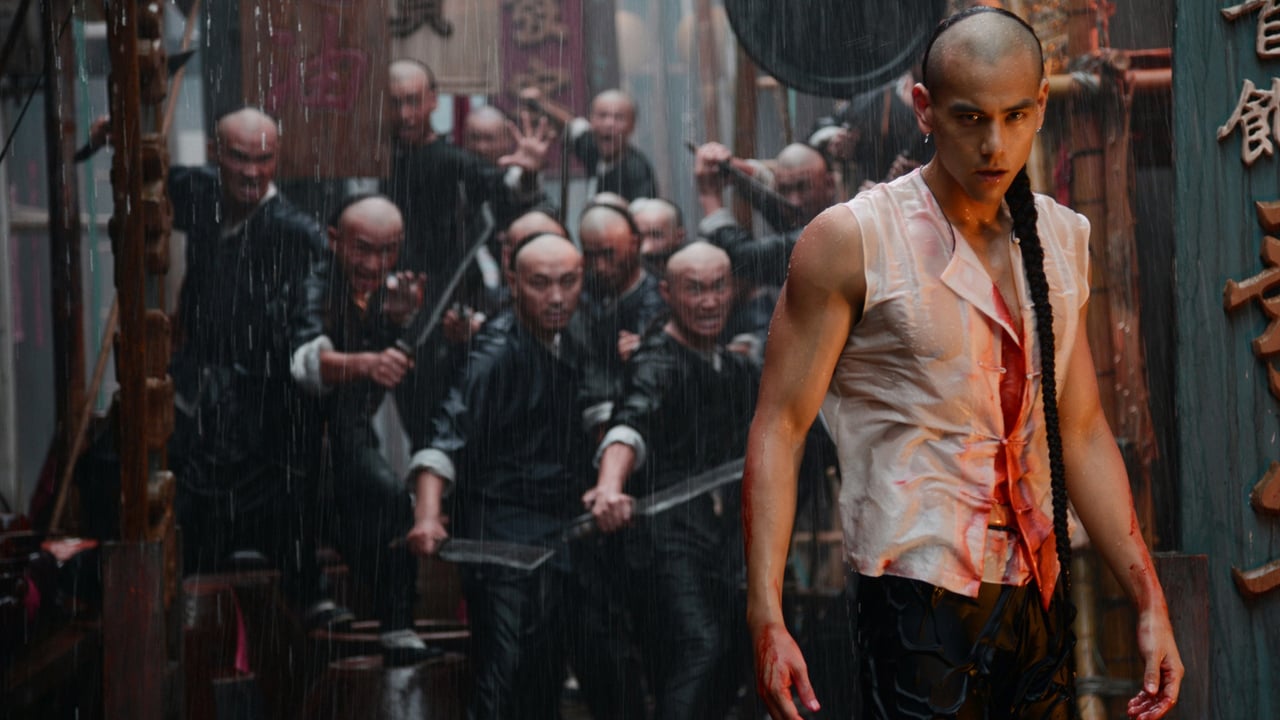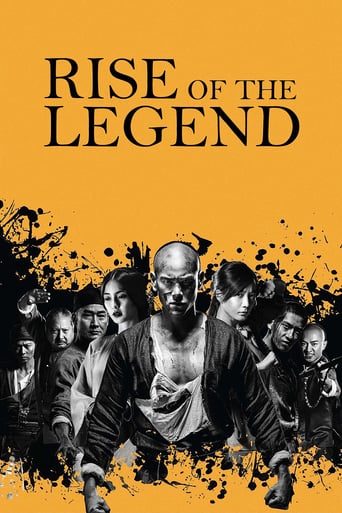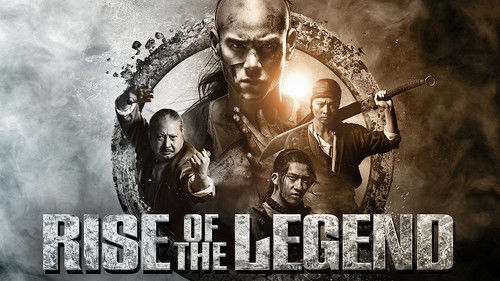


Before I can really discuss "Rise of the Legend", I need to give you some background. This isn't especially clear in the film and for non-Chinese audiences, the setting might be confusing. In the 19th century, various nations forced the weak Chinese Ch'ing leaders to accept their presence in the country. Countries like Britain, Russia, France and even Japan carved out portions of the country to be used as bases for trade and one of the ways they made money was in the opium trade. Additionally, Chinese warlords and gang leaders worked with these foreigners to exploit the country and its wealth and, not surprisingly, the common people resented this. But these foreigners and their Chinese partners were getting rich and had little regard for the damage they were causing. This led to a variety of wars (such as the Opium Wars and, later, the Boxer Rebellion) and eventually to unification and the abolishment of the Emperor--who seemed to care little about the plight of the people or the weakness of his country. One hero during this period of civil war and chaos was Wong Fei-hung (also known as Huang Feihong). His prowess with martial arts made him a rallying point and many of his exploits have been celebrated and exaggerated in movies over the years, such as Jet Li's "Once Upon a Time in China" and Jackie Chan's "Drunken Master" films. The latest in a long line of semi- biographical films is "Rise of the Legend".In this version, the earlier part of Wong Fei-hung's life is explored by director Roy Hin Yeung Chow and the legendary man himself is played by Eddie Peng. While Peng is not exactly a household name, his martial arts skills are superb in the film-- mostly because they are both incredible to watch and generally believable. Little so called 'wire fu' is used in the film and heroes DO bleed and get the snot kicked out of them from time to time. The only really difficult to believe part for me was watching the familiar actor Sammo Hung fighting the hero to nearly a draw. While Hung has made a ton of martial arts films (many with his friend Jackie Chan), he is in his 60s and, well, a bit rotund (I have NO reason to talk in this department)--and seeing him battle Peng did take some suspension of belief, though Hung did amazingly well and surprised me with his performance.The film is a bit difficult to follow, as some things in the plot the film assumes the viewer will know. Additionally, the storytelling is occasionally non-linear. So, as I watched, I found that I really needed to pay attention, understand the context and piece it all together in my mind as I watched. What you slowly come to realize is that the evil leader of the Black Tiger Gang in Canton, Lei Gong (Hung), has just made Wong Fei-hung his fourth adopted son after Wong single-handedly kills one of Gong's rivals and takes out a HUGE number of the guy's soldiers. You can only assume Wong is evil, as Lei Gong is rich from his profits in selling opium and slavery. However, as the film progresses, you realize that Wong is playing a very deep plan--one that aims to eventually free the slaves, destroy the opium warehouses and aid the common man. Considering that Lei Gong is ruthless, evil, has an army of his own and has three other adopted sons who are amazing with their martial arts skills, Wong's task seems monumental to say the least!So is this any good? Well, generally yes. The action is first- rate. While not quite as wild as you might find in many films, the martial arts fighting looks real and it will keep you on edge. Additionally, there are many story elements that work well. My only qualms are the way the story is presented. As I alluded to above, the film can be a bit hard to follow and sometimes I got the feeling that I've seen many similar films--and I have considering how many Wong Fei-hung films have come out of China in the last few decades! My verdict is that if you are a fan of the genre and understand the context, by all means watch this one. If not, then it's not exactly a must-see film...though you certainly can't go wrong watching it.
... View Morespecial effect, in addition to overly told repetitive boring storyline, totally unnecessary long and tiresome fighting scenes. the only impression of this bad movie is boring, boring and boring. why the Chinese movie industries in mainland china and hong kong so obsessed with this hwang legend. the dialog either done by the actors or voice over by some other people solely doing such line of work, but either turned out to be naturally enough just because of the contrite dialog. it's such a boring storyline with randomly inserted flash backs of the teenage kids or used some westerners for background extra purpose. there is nothing interested enough to keep the interest or focus. every scene in this film looked staged including the costumes and the make-up. the dialog is just so boring and the tempo of the most part of the film is too slow with suddenly explosive fighting scenes, but then again, the off screen narration by the main character also making the viewer like me feel unnecessary and awkward. i know this actor from taiwan is now a rising star, quite hot because he's been showing himself in so many films in recent years, but he actually is not an unique find but a regular and blended guy. all in all, this film is marginally watchable flick, if you have other better choice to kill the time, don't waste it on watching this, it's just so boring.
... View MoreWhen I watched Rise of the Legend I wasn't aware that it's the origin story of Wong Fei Hung, so the revelation was a pleasant surprise. Different from many iterations of the iconic kungfu master, this one sets a more gangster oriented approach as Fei Hung tries to rid the city of the cruel mafia. The production is splendid with fantastic shots and clever use of camera during the fight scenes.Peng Yuan as Fei Hung is a great choice, he brings a brash and sometimes cocky nature that hasn't been seen often in this type of movie. Contradicting the wise mannered Fei Hung, he looks much more reckless, crude and exceptionally younger. The character goes through many developments in the course of the movie as he gradually becomes more mature and weights his responsibility. Also, he looks the part and able to perform the tricky moves.While this is still an action film, the focus is centered heavily towards crime aspect, including drug dealing, prostitution and other unsavory acts. Depiction of the corrupt city and the intricacy of the criminal empire are shown with high level of pomposity. It has been influenced by more modern vibe and is definitely a darker rendition than most kungfu movie of its kind.The movie has brilliant cinematography. Lingering poverty, dusty and murky streets, as well as shady dealings underneath dim light are depicted with gritty innate outlook. It fuses with great choreography, creating incredible brawls after brawls. The way the view changes direction, springs above or near the action, and simply effective slow motion make the combat much more enjoyable.However, the script has some fundamental issues. On occasions, the twists are handled without precision, often making the scenarios seems highly unfeasible. The movie brushes these disparities aside for the sake of pushing the plot. This is counterproductive to the realistic intrinsic it has produced. Some scenes are highly questionable as if the transition into latter arc is forced to make sensational set pieces.Sammo Hung is a veteran of the genre, but recently he's stuck on the same role. In here he doesn't distinguish himself enough from many other roles he had. It's unfortunate since his character could've had more emotional range. The movie has good foundation for brotherhood and loyalty theme, almost a reminiscence of Gangs of New York, but lacks the necessary complexity to fully realize its potential.Regardless of the bumps at the middle of the film, Rise of the Legend is an exciting action flick with fresh perspective and aesthetic production.
... View MoreNo less than two decades have passed since Jet Li took up the iconic role of Wong Fei Hung in Tsui Hark's classic 'Once Upon A Time in China' series, and for good reason, no filmmaker for that matter has dared mount a similar big-screen version of the renowned folk hero. Until now of course – 'Rise of the Legend' sees Hong Kong director Roy Chow Hin-Yeung step up to the challenge of re-making a legend by way of an origin story, casting rising Taiwanese actor Eddie Peng as the titular protagonist.We're sad to disappoint fans of Peng, but the actor is simply no substitute for Li. The comparison, unfair as it may be, is inevitable, because Li had so completely inhabited the character that the very first impression which comes to mind when one thinks of the character is Li himself. While he may project enough confidence and fresh- faced charm to convince as a younger and brasher Wong Fei Hung, Peng simply lacks his predecessor's poise and nuance to make his portrayal as dignified and compelling.A lot of Peng's performance doesn't go much further than posturing, alternating between a smug self-confident demeanour when with the members of the villainous Black Tiger gang whom he infiltrates to dismantle from within and a spirited show of grit (not unlike that which he displayed in 'Unbeatable' as an MMA-fighter) when taking on his opponents fist-to-fist. Only when he gets the occasional reprieve to hang out with his childhood buddies Fiery (Jing Boran) and Chun (Wang Luodan) do we see a more sincere and earnest performance from Peng, but these scenes – given the covert nature of his character's personal mission – are sadly few and far in-between.Though he may have the athleticism and physique (we're talking oiled-up pecs and rippling abs here) to boot, Peng lacks the physicality of someone who's trained in the martial arts. Indeed, that is too ostensible in the action sequences directed by veteran choreographer Corey Yuen, which in narrower high-walled alleyway settings is filmed with the sort of artistic distractions emulating last year's 'The Grandmasters' – complete with rainwater, (plenty of) slo-mo shots and p.o.v. framing – that sees Peng look rather than truly impress and in more expansive locations relies too heavily on the use of wirework to augment Peng's moves (or lack thereof). The fact that the fight sequences aren't as exciting as they should be isn't Peng's fault alone no doubt, but, unfortunate as it may be, it still is too clear Peng isn't a natural performer the way other luminaries like Li, Jackie Chan or Gordon Liu were.To be sure, Peng is hardly the start of 'Rise's' problems, which, though absorbing in parts, has its obvious flaws. Though intended as a story to explain the origins of Wong Fei Hung, Christine To's script hardly gives the character much depth. A few flashback sequences show Wong's father (Tony Leung Kar-Fai) imparting some words of wisdom about saving people which he continues to hold dear as well as how a brief stint at a monastery transformed his sense of vengeance following his father's death at the hands of some local thugs to one seeking justice, but come off obligatory rather than poignant. There is even less time to get to know Fei Hung when Peng takes over as a young adult, as To has him too busy caught up in the plot machineries of a gangland thriller than to build a multi- faceted portrait of him – other than the already established fact of his inimitable sense of righteousness.Not that the colourful underworld comprising of Sammo Hung as Master Lei, the leader of the Black Tiger gang, and his adoptive sons – North Evil (Jack Feng), Black Crow (Byron Mann) and Old Snake – isn't entertaining; there is good fun to be had in watching Fei- Hung, Fiery and Chun destabilise the squabbling trio and their domineering head from within – as Fei-Hung wins Master Lei's trust by killing the head of the rival North Sea gang to become his fourth adoptive son – and without – with Fiery and Chun leading the poor, hungry and oppressed men on the streets under the banner of the Orphan gang against the Black Tigers. To weaves quite an ingenious scheme here, so much so that Chow's filming struggles to keep up, and there are scenes which would clearly have benefited from the direction of a stronger helmer.That is probably also part of the reason why To's attempt to paint Fei Hung as a man with a big dream of restoring justice to the masses, who stuck with his ideals even though they came at a hefty personal cost, isn't quite as rousing as it is meant to be. Yes, sacrifice figures heavily in the third act, but because the friendship between Fei Hung and his childhood buddies doesn't get enough screen time to be fully fleshed out, the eventual denouement awaiting some of them, in particular as it relates to Fei Hung, is less moving and persuasive. Whereas one would have expected a character-driven narrative for this origin story of Wong Fei Hung, Chow and To (whose previous collaborations include the unintentionally hilarious detective thriller 'Murderer' and a middling follow-up 'Nightfall') opt instead for a plot-driven one that transplants the elements of a gangland thriller into a martial arts actioner. The result is more the former than the latter, so those expecting some thrilling fight sequences will surely come off disappointed – more so after a lacklustre showdown between Peng and Hung in a blazing warehouse where the two do more staring at each other and asking each other how 'hot' it is than fighting. For now, this 'Legend' remains firmly with Li and Tsui Hark, whose 'Once Upon A Time in China' remains the only Wong Fei Hung you need to know.
... View More